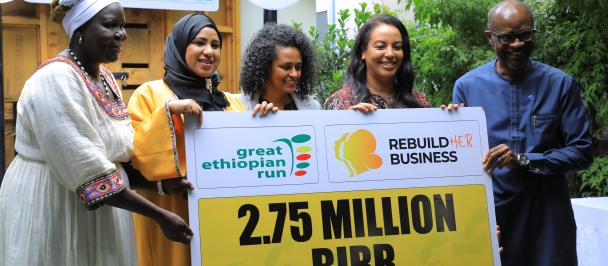Part 1 (Ethiopia)
Asha Golicha, lives in the border town of Moyale and gets support from UNDP cross-border programme
Challenges related to peace and security, economic development and climate tie most of the countries in the Greater Horn of Africa (Djibouti, Eritrea, Ethiopia, Kenya, Somalia, South Sudan, Sudan and Uganda), but this is particularly true in the borderlands, where scarcity of resources, extreme poverty and environmental stress trigger conflict and violence.
A cross-border Ethiopia-Kenya-Somalia project with the support of the European Union is helping create opportunities for vulnerable communities and expand cross-border trade.
The importance of education
Asha Golicha, 46, lived her whole life in Moyale, a small market town across the borders of Ethiopia and Kenya, some 800 kilometers south of Addis Ababa, Ethiopia’s capital city. As most women and girls in the region, Asha married at 16 and did not have a chance to go to school.
That’s why she sees her children’s education as primordial:
“I want all my children to learn. I feel bad about myself because I did not go to school. If you do not learn now, you will not survive. Learning can get you out of poverty.”
Asha’s husband with their children and grandchildren at the doorstep of their house
Living that close to the border means that Kenyan children go to Ethiopian schools and vice-versa. Asha’s 11 children attended primary school in Kenya before returning to Ethiopia for their secondary education. Two of her sons are now studying in Addis Ababa.
A woman’s burden
Most of the house’s and family’s responsibilities fall on Asha’s shoulders. But, even though the family owns farmlands, Asha is only able to grow crops once every 3 to 4 years because of the ongoing drought in the region.
So, to make a living, she travels 200 km every Sunday to a market where livestock is sold at cheaper prices, buys as many cows as she can afford and resells them at a profit in the Kenyan side of Moyale.
“The money that we make is not that much, it is just enough to feed the kids. Sometimes when I go to the cow market, I don’t even get to buy any of them. The profit is not big but every month I can get about 3000 Ethiopian Birr” (US$100)
Agents of change
Asha’s situation resembles that of most women in the region: They tend to work more than men, and carry greater responsibilities in taking care of the children and their household, which brings them to show greater solidarity towards each other.
With the support from the European Union Emergency Trust Fund for Africa (EUTF), and together with Intergovernmental Authority on Development (IGAD) and the UN Environment Programme (UNEP), UNDP cross-border programme aims to help those hard-working women become more self-sustaining.
Launched in February 2018, the initiative has created awareness and promoted cross-border trade opportunities for women, such as the One Stop Border Post, allowing free movement of livestock and persons across the border. Since women are for the most part the ones engaged in informal cross-border trade, they are expected to benefit from such opportunities.
Left to right: Butter, coffee and livestock for sale at the local market in Moyale, Ethiopia
Agents of peace
For Asha, lack of jobs and political instability are the biggest problems in the region.
“If there is peace, there is no problem at the border. But when there is conflict, there is no way to go there [Kenya] and people don’t come here in Moyale to buy.”
Asha with her husband and grandson
"Women play important roles in peacebuilding and are essential to creating long-term, sustainable peace. We have seen many examples of how women’s peace initiatives have transcended the boundaries of nationality, religion, class, and socioeconomic background in their work for peace. Empowering women in cross border areas has also had a positive multiplier effect on poverty reduction, economic growth, government revenues and employment creation, among other factors." noted Erik Harbers, Head of Cooperation at the European Union Delegation to Ethiopia.
"Investment in peace is a critical piece of the durable solutions puzzle for turning cross borders from fragile areas into a ‘hotbed’ of opportunities. Our current strategy – focusing on local institutions - integrates technical expertise to plan, manage and deliver, as well as the ‘soft’ skills that promote dialogue, trust and consensus-building, with an eye on the end-game: resolve conflict and promote peace." noted Cleophas Torori, UNDP's Deputy Representative for programme in Ethiopia.
The Project is coordinated by the UNDP Regional Service Centre for Africa (RSCA) and is implemented in partnership with UNDP Country Offices of Ethiopia and Kenya, IGAD and UNEP with funding from the European Union Emergency Trust Fund for Africa (EUTF). The implementation is closely coordinated with the national and local Governments of Kenya, Ethiopia and Somalia.
Footnotes: Text by Anna Moghilda UNDP RSCA / All photos © Anna Moghilda/UNDP RSCA.

 Locations
Locations






